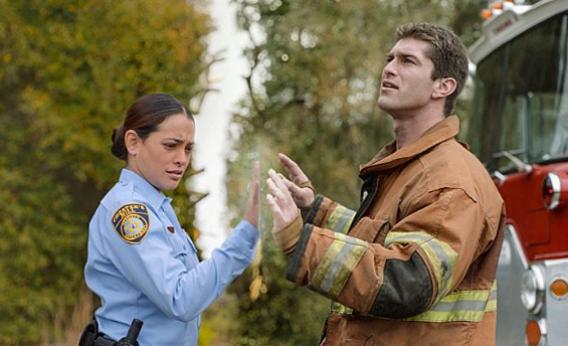The 2009 Stephen King novel Under the Dome concerns a small town abruptly sundered from the rest of America by a transparent hemispherical membrane of seeming supernatural origin. To visualize this, imagine the surface of the Earth as the flat surface of a footed cake plate and the dome as the thingie atop it. Does the phrase Glass Cloche Encounters capture the spirit of the book? Would an invocation of The Simpsons’ Trappuccino be more apt? These questions are not rhetorical; really, I’m asking, for in describing the premise of this thousand-page novel, I also have defined the only circumstances under which I would read it.
Sorry, but I haven’t even gotten to The Stand yet, and the pilot episode of Brian K. Vaughan’s television adaptation of Under the Dome (CBS) is a very good advertisement for seeing what else is on TV this Monday at 10 p.m.
The series does itself no favors with an introductory sequence that wanly recalls Twin Peaks as it introduces the characters and their situations. Highly skeptical, eyebrows growling, I witnessed an eerie close-up of a bird on a limb, a bit of music recalling Angelo Badalamenti, a waitress post-coitally slipping into a mint-green diner dress to work a shift at a failing restaurant. … My notes say I saw a corpse wrapped in plastic, but that might just have a figment of hypnotic suggestion, a vision conjured by the other sounds and images—genre-markers saying, “Welcome to the Superficially Cozy Small Town Harboring Dark Secrets.”
In the novel, this town goes by the name of Chester’s Mill, Maine. In the pilot, the location of Chester’s Mill remains unidentified. The series hints that the town could exist Down East; among the people trapped under the dome are an artsy-fartsy interracial lesbian couple from California, who are passing through town on their way to drop off their surly teenage daughter at summer camp. But the series was shot in North Carolina, with the apparent aim of sucking enough charm out of Wilmington to allow it to pass for a generic Everytown, and the series was cast with a cynical eye for demographic balance, such that it never welcomes the viewer to the state of suspended belief.
Thus has an opportunity been missed. An Under the Dome that crackled with realistic rural Maine flavor—with subtitles to translate the accents and everything—could be a lot of fun. I’m imagining the natives’ self-reliance coming in handy as they endure their sci-fi confinement—and also their libertarian streaks clashing with the reflexive attack on civil liberties described in the plot. (On CBS, Breaking Bad’s Dean Norris juicily plays Big Jim Rennie, a selectman who, faster than you can say exigent circumstance, uses the dome crisis to solidify his big-time plans for small-town domination.) And in my version, the characters would include a clutch of Bowdoin sophomores who found themselves in the wrong place at the wrong time while heading to Stowe in a 325i.
What we get instead are a plucky Latina sheriff’s deputy, a ruggedly handsome and doggedly mysterious Army vet, a newspaper editor with an investigative background and a Rebekah Brooks tonsure, and a local DJ who may yet develop into an amalgam of Samuel L. Jackson’s Mister Señor Love Daddy and John Corbett’s Chris Stevens. There’s also a set of unsupervised teenage siblings; when the dome landed, their mother was eating at a chain restaurant in the next town over, and the kids’ discussion of that meal occasions a sentence never heretofore uttered in the history of the American language: “Mom’s having brunch with Uncle Steve at Denny’s.” No one brunches at Denny’s, of course. That would be like domiciling at an EconoLodge.
The dialogue tends in that fashion toward florid improbabilities of vernacular speech. When a small aircraft collides with the dome, one character says to another, “Call the FAA!” Reply: “The feds?!”
Vaughan, writing and directing these lines, is hauling the Stephen King brand into risky territory. The risk is boredom—the half-puzzled, half-irritated sort of boredom elicited by later seasons of Lost. Under the Dome’s showrunner, in addition to writing addictive comic book series, was indeed a producer of late-season Lost, and CBS’s effort to explore current trends in semi-existential speculative fiction is almost charming in its awkwardness. So far, the main philosophical riddle it inspires is: Why don’t these guys try digging their way out?
